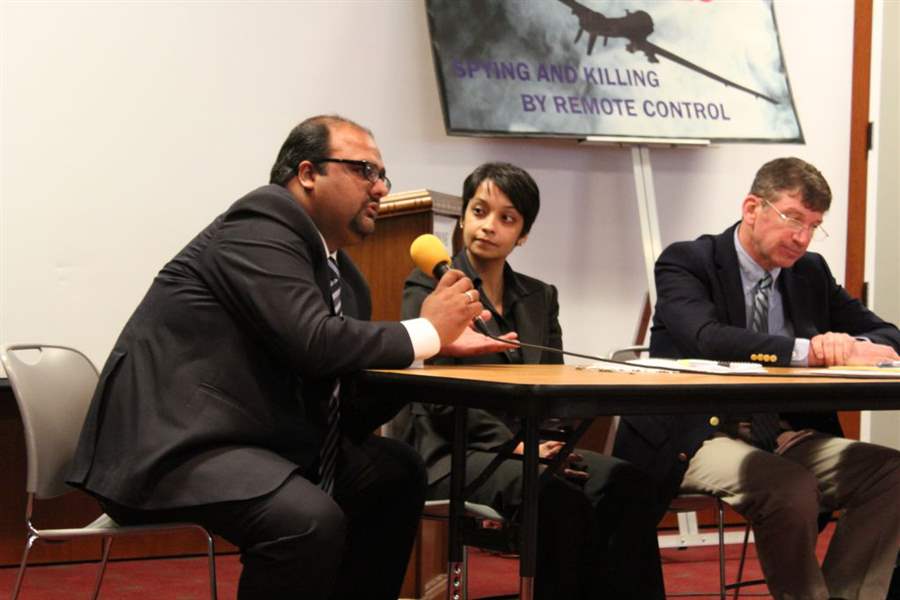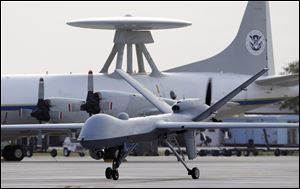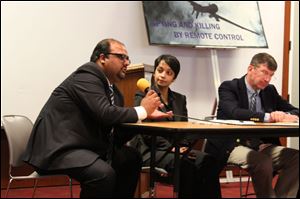
Opponents of drones tell of cost to victims
OK for wider use intensifies debate
4/29/2012
Attorney Shahzad Akbar, left, speaks at a conference organized by the anti-war group Code Pink as Hina Shamsi of the American Civil Liberties Union and David Glazier of the Loyola law school listen. Mr. Akbar showed photos of Pakistani victims of predator drones.
photo courtesy of noreen nasir

Opponents say use of Predator drones such as this is too invasive and makes it easier for the United States to justify entering conflicts. Even some supporters say the government should proceed with caution.
WASHINGTON -- Are they remote-controlled killing machines or cost-efficient technological wonders that keep American fighter pilots out of danger zones? It depends whom you ask.
Drones, or unmanned aircraft used in airstrikes and reconnaissance missions, are rapidly changing warfare and just as quickly raising concerns of peace activists, civil libertarians, and others who say the technology is too invasive and makes it too easy for the United States to justify entering conflicts.
The debate has grown even more intense since last week, when the Obama Administration gave defense and intelligence officials broader authority to use drone strikes against militants in Yemen even when the identities of those who could be killed aren't known. That authorization, first reported by the Wall Street Journal, is a shift from the policy that allowed only focused attacks on known al-Qaeda affiliates in Yemen.
At a daylong anti-drone summit in Washington on Saturday, Pakistani attorney Shahzad Akbar -- who spent months trying to get a visa to come to the United States-- put faces on the victims of drone strikes.
"We have to see what exactly is happening on the ground, what is happening to the people," he said. "It is very strong footage so I apologize for it but I thought you should see it."

Attorney Shahzad Akbar, left, speaks at a conference organized by the anti-war group Code Pink as Hina Shamsi of the American Civil Liberties Union and David Glazier of the Loyola law school listen. Mr. Akbar showed photos of Pakistani victims of predator drones.
He showed a photo of a teen named Sada ullah, who had been helping his mother in the kitchen when the family home in Pakistan was fired on from a drone in 2009. He woke up in a hospital three days later without his legs, Mr. Akbar said.
He also showed a photo of Sanaulla, a 17-year-old pre-engineering student burned alive in his car during another strike in 2010.
A series of photos of the Bismillah family made the audience gasp: mother, father, and 10-year-old girl, all dead, the youngest with a bloody crater in her face.
Their 8-year-old son died too, but Mr. Akbar said he "didn't have courage to show his picture because that's even more mutilated."
Many at the conference organized by Code Pink, an anti-war group founded and led by women, decried the administration's new policy.
"What we heard this week is that we don't need to know who we're attacking," said Sheila Carapico, professor of political science and international studies at the University of Richmond. "We can strike without intelligence about who's there or what they're doing based merely on the appearance from [drone footage] in the air."
Deborah Zubow, 60, of West Philadelphia, said the fact that the craft are unmanned especially bothered her. "It's video-gamization of war where you just push a button and 50 people die and you don't even have to have boots on the ground," Ms. Zubow said. "I find that repugnant."
Caution urged
Even those who support the use of drones say the government should proceed with caution in order to allow both public opinion and regulations to catch up with the technology.
"Pushing too quickly will lose the support of the public and very much run the risk … of driving the technology over the cliff of public assistance into a ditch of public dismay," former Homeland Security Deputy Assistant Paul Rosenzweig said during a briefing earlier this month at the Brookings Institution.
Aircraft manufacturers and congressional supporters of drone warfare -- there's even a 55-member House Unmanned Systems Caucus -- say that unmanned aircraft are useful strategically, tactically, and scientifically. They are less expensive than piloted planes, keep troops out of danger zones, support engineering and manufacturing jobs, and help provide homeland security, according to the caucus.
Outfitted with sophisticated video cameras and night-vision lenses, surveillance drones provide real-time images that help field commanders decide where to deploy troops, determine whether civilians are present, and calculate trajectories.
Selling war
Panelists at Saturday's conference, though, said drones make it too easy for presidential administrations to sell war to Congress and to the American public by creating the impression that there's no risk of U.S. casualties.
"We can kill people without any risk to ourselves and that's why the politicians like it," said Clive Stafford Smith, founder and director of Reprieve, an organization that helped secure the release of 65 prisoners from Guantanamo Bay.
The cost to foreign civilian populations was a focus for many. These were the stories Mr. Akbar, the Pakistani attorney, came to tell, the faces he wants Americans to see.
He's interviewed about 200 victims of drone strikes in northwest Pakistan and is representing some of them in a lawsuit he has filed against the United States.
Americans pay a price for the violence, even if they don't realize it, Mr. Akbar said. Drone strikes inspire hatred of the United States and turn the victims into anti-American militants, he said.
"People are being killed in your names and this is not making America safer; it's just creating more enemies for you," he said. "You have a target sign on you just because of the policies of your government."
Seeking U.S. entry
Mr. Akbar has been trying to come to the United States to speak on behalf of Predator drone victims for more than a year but said the State Department blocked his visa to prevent him from publicizing his lawsuit. He said the department relented last week without explanation.
"For the last 14 months I was told there's no visa, there's no way I would be given a visa because I really annoyed some people at Homeland Security and other agencies in the United States for challenging the drone program," he said. "Bringing in any human life story is simply not acceptable [to them]."
A State Department spokesman said he isn't permitted to speak about individual visa applications.
Civil liberties activists have their own concerns about drones. They fear domestic intrusions from commercial and governmental drones.
New uses
In February, Congress directed the Federal Aviation Administration to craft regulations governing the licensing of commercial drones. That could open the skies to increased domestic surveillance and commercial data-gathering of the sort that concerns groups such as the American Civil Liberties Union.
Drones "really have the potential to become a new avenue of surveillance in American life. There are 747-size drones, but there are drones as small as little hummingbirds that can fly up, buzz around, look in windows and stuff like that," Jay Stanley, an ACLU senior analyst, said.
The FAA has approved 300 certificates to operate drones filed by public entities including local police departments, universities, and federal departments.
The FAA released the records after the Electronic Frontier Foundation sued to get them.
Panelists Saturday said drones have the potential to be equipped with heat sensors, Geographic Positioning Systems, license-plate readers, extremely high resolution cameras, infrared cameras, and facial-recognition software. Coordinated swarms easily could track people's daily movement from home to the office to a political rally to the grocery store.
Proponents say surveillance drones provide real-time images useful to more than just law enforcement. The real-time images and data they gather can be valuable for environmental monitoring, weather forecasting, and homeland security.
They're already being used in Texas and Arizona along the Mexican border, which Mr. Rosenzweig said was a more efficient way to patrol.
But the technology is ahead of government oversight, Mr. Stanley said.
Technology, privacy
Current privacy law doesn't offer enough protection from the invasive use of those kinds of technology, and laws need to be updated to limit the use of surveillance drones, Mr. Stanley said.
"This technology is way ahead of the legal framework for dealing with it," agreed Code Pink co-founder Media Benjamin.
"Laws, both domestic and international, should be used to monitor and regulate the use of drones. I think we can all agree that as a democratic society we have not had a chance to have input on how drones are used."
The Block News Alliance consists of The Blade and the Pittsburgh Post-Gazette. Tracie Mauriello is the Washington Bureau chief for the Post-Gazette.
Contact her at: tmauriello@post-gazette.com or 703-996-9292.